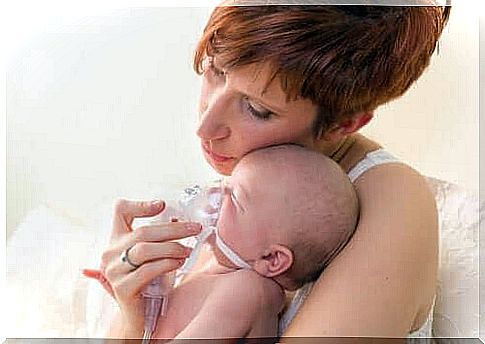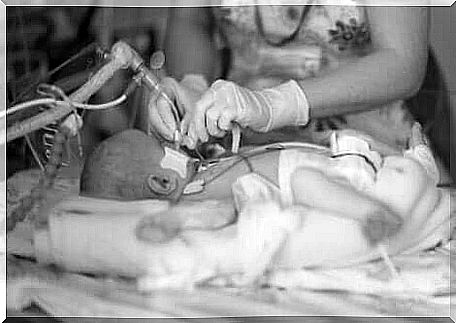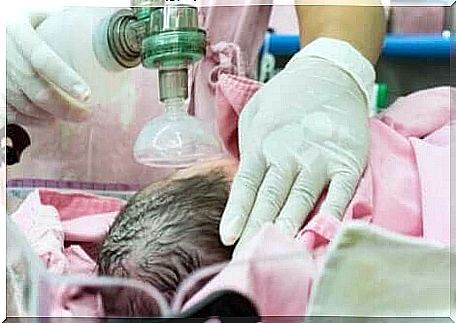Most Common Neonatal Respiratory Problems

The lungs are the last organ to develop before birth. Therefore, neonatal respiratory problems are a common problem. Especially if the baby is born prematurely, the lungs may not be fully developed. The baby is then more exposed to certain risk factors.
Genetic factors can also cause breathing problems in newborns. Other factors that can cause these problems include:
- complicated deliveries, characterized by impaired blood circulation of the fetus.
- infections that the baby gets after birth.
In all cases, treatment is key, as neonatal respiratory problems can have serious consequences. In fact, they are one of the leading causes of death in newborns.
What Are the Symptoms of Neonatal Respiratory Problems?

The main problems doctors try to identify right after delivery, as well as in the days after, include:
- is the baby breathing?
- is it shallow breathing?
- is there respiratory sinus arrhythmia?
- does the baby snore when breathing?
- Does the baby have excess mucus?
- is the baby having trouble breathing?
Most Common Neonatal Respiratory Problems
There are many different types of neonatal diseases and respiratory problems. We will explain the most common types below.
apnea
This phenomenon occurs when the baby stops breathing for about 20 seconds. It usually develops when the lungs are underdeveloped.
If there is apnea, the baby’s heart rate may decrease. Bradycardia (a slower than normal heartbeat) and bluish skin discoloration known as cyanosis may occur.
It is common in babies born by cesarean section and in premature babies. This complication usually resolves within 24 hours when the baby is given supplemental oxygen.
Pneumonia
Babies born prematurely are at a higher risk of developing pneumonia because their lungs are not fully developed.
Meconium is the first stool that a newborn baby expels. Sometimes the baby can inhale this along with amniotic fluid during delivery. This can cause an infection that can lead to pneumonia.
Respiratory Distress Syndrome (RDS)
This condition is also more common in premature babies, especially those born between 36 and 39 weeks gestation. At this stage of the baby’s development, no or insufficient pulmonary surfactant is produced.
This is a fluid that protects the lungs and helps them to open the alveoli without pressing on the alveoli. It thus protects the alveoli from pressure. The result of a lack of this fluid could be a collapsed lung.
Bronchopulmonary Dysplasia
This is a complication that is not congenital in the baby. Babies can develop this problem from the necessary treatments they receive if they are born prematurely. Giving oxygen to a baby, although it is necessary to save his life, can damage the fragile lungs. If this happens, the baby may have difficulty breathing.
Pneumothorax
This problem occurs when there is air between the lung and the chest at birth, which puts pressure on the lungs in the newborn. When this condition occurs, the baby has bluish skin and difficulty breathing.
Medical professionals should intervene immediately and start treatment by inserting a catheter that helps to remove trapped air from the chest.
Other Neonatal Respiratory Problems
In addition to the above conditions, there are other less common but equally serious neonatal respiratory diseases:
- Congenital bronchiectasis. This is a respiratory infection caused by an infection.
- Pulmonary hypoplasia. Incomplete lung development is caused by a congenital defect.
- Congenital pneumonia. An inflammation of the lung tissue that is not caused by outside infections.
Can Neonatal Respiratory Problems Be Prevented?

Respiratory diseases are difficult to predict and prevent. That’s why experts recommend that you follow the following tips during pregnancy to minimize the risk of problems:
- Go to all your medical checkups.
- Follow a healthy diet.
- Do not smoke cigarettes and cigars.
- Avoid drinking alcohol.
- Do not do drugs.
In all cases, maintaining healthy habits helps to increase the chances of a healthy pregnancy. That way you can potentially prevent a premature delivery and reduce the risk of underdeveloped lungs.









